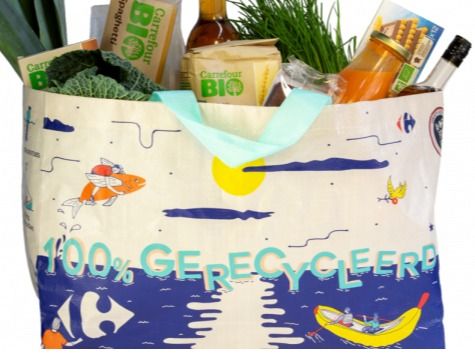
Added: Dec 21, 2022
Last edited: Jan 17, 2025
In 2019, Carrefour Belgium launched a new range of reusable and recyclable carrier bags made from end-of-life fishing nets and ropes. Carrefour Belgium has collaborated with SEAQUAL INITIATIVE to have access to the Upcycled Marine Plastic used in making these eco-friendly bags.
Plastic is ubiquitous in today's society. A great amount of plastic is specifically flowing into the packaging industry. However, economic and technical limitations cause most plastic packaging to have a linear and unsustainable life, often characterized by a very short use phase.
In 2019, Carrefour Belgium launched a new range of reusable and recyclable carrier bags made from end-of-life fishing nets and ropes.
Carrefour Belgium has collaborated with SEAQUAL INITIATIVE to have access to the Upcycled Marine Plastic used in making these bags and estimates that around 10 kilograms of Upcycled Marine Plastic are used in the production of every 100 bags. These recycled plastic bags are available in all of the 800 Carrefour stores in Belgium.
Carrefour is collaborating with SEAQUAL INITIATIVE to support ocean clean-ups to take action against marine litter.
SEAQUAL INITIATIVE is a community with a single voice against plastic pollution. Carrefour brings together individuals, organizations and companies, to help clean the oceans, raise awareness of the issue of marine plastic and highlight the heroes who are working to solve it.
These ocean clean-ups collect all types of waste; plastics, metals, glass, rubber, and mixed material items – everything from shoes to refrigerators!
Because mixed waste is expensive to recycle, in the past much of this waste was destined to landfill or incineration. SEAQUAL INITIATIVE is dedicated to giving a second life to this material. At SEAQUAL INITIATIVE Carrefour doesn’t look for materials to recycle, it recycles the materials it finds.
Beware that durable goods need to replace disposable alternatives (in this case polybags) a certain number of times to have an environmental benefit.


Reusable, recyclable materials and inputs
Open loop upcycling
Sale of durable, long-lasting goods
Design for recycling
Design for reuse
Design for physical durability
Cross-industry projects, pilots
switch2ceplastics
